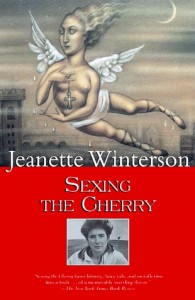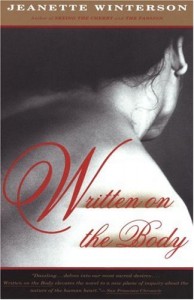#jeanettewintersonlivetweet: Sexing the Cherry by Jeanette Winterson
 Sexing the Cherry
Sexing the Cherry
by Jeanette Winterson
First Edition Bloomsbury, 1989. Grove Press Reissue, 1998.
192 pages / $14.95 Buy from Amazon
I just read a review of Sexing the Cherry online, through JSTOR. The article is written by Rosellen Brown, and is published in The Women’s Review of Books. It is called “Fertile Imagination.” Considering the content of the book, that title is funny to me. I’m honestly not sure if the review is favorable or not. She keeps praising the ‘inventive arbitrariness’ of the novel at the end of it, seemingly out of nowhere, somewhat condemns the thin veil over what she refers to as Jeanette Winterson’s ‘wish-fulfillment fantasies.’ That got me thinking about this sandwich I bought from Wawa earlier, and how when I was walking back to my house after buying it, I thought about how Jordan is very much like the titular character of Henry Fielding’s The History of Tom Jones. They are both foundlings, both of them are charismatic and somewhat sensitive; somehow my train of thought disappeared though, and my mind drifted from the process of it, like a moving vehicle. In this review I learned that Jeanette Winterson is herself a foundling, and much of her character is apparent in Jordan. Does this mean Jeanette Winterson is also like Tom Jones? By the transitive property, it would seem so. But does the transitive property define reality? I’m not sure, but if it were so, this would lead to a comparison of Tom Jones’s Squire Allworthy and Sexing’s Dog Woman, who, I feel, are not compatible characters at all. I am wondering what would happen if Allworthy and Dog Woman were in the same room. She is so used to men literally ‘pointing dicks’ at her, forcing/inciting her to violence against them. Allworthy is not that way at all, though. He is, I feel, one of the most benevolent of Fielding’s creation. Maybe he just lives in a more humanistic era than Dog Woman. The next paragraph is imminent; in it I will discuss what happened when I first read Sexing the Cherry.
I was on the third floor of a college library with Sexing the Cherry on my lap. I was tired. I wasn’t thrilled to be in the library, even though generally I like it there. I decided it would help me stay attentive if I ‘livetweeted’—that is, ‘to tweet in real time’ my process of reading it, by means of phrases that I found interesting maybe. I did this for around two hours. A list of things I found tweetable:
So, there is that. Looking at it now, it’s kind of like a poem. Some of the phrases are taken out of the contexts of the sentences they appear in, for my linguistic pleasure, and, I think, yours as well because you’re reading this. I mean, what is context really, especially considering the text of Sexing the Cherry, wherein there is no context given to the reader; through one’s own constructions/deconstructions/discursive formations/ideologies/psychoanalyses/feminist reconstructions only can meaning be derived from this book. The crux of this review, really, is being set up currently. I want to define something about this book—not make a guess as to what gender some fruit represents, or what is represented by the splitting of said fruit. Truly make a claim about what something in this novel ‘means.’ Here is my theory about Sexing the Cherry.
It is clear, from the outset, at least, if one reads the inscriptions before the text begins; those two things—the one about the Hopi tribe’s language lacking tenses for time and the other about matter being mostly empty space—that the universe is not as it seems. The one in the book, I mean. There is deliberate anachronism not only in the physical setting of the novel (I’m not usually one to judge, but Dog Woman and Jordan live in a pretty ‘temporally fucked’ part of 17th Century England) but in the way time is presented through language and the novel’s linguistic structures. Sexing the Cherry presents a universe in which time and space are not interwoven into our coveted, Einsteinian fabric; indeed, they are separate, and ever-colliding. These collisions are marked by pictures of fruits and, in the middle of the novel, fairy-like relics. As a result of the lack of connection between time and space, perspective is fluid; not how our universe’s perspective is fluid, in that a worldview can change through a human’s own will, but that dominance of perspective is constantly shifting. The rift between special coordination and the motion of things causes all consciousness to warp together, and the dominant perspective is in omnipresent shift. That is why every time there is a fruit somewhere, the narration seems to change and, towards the end the fruits are all split—this is an indicator of the unstable temporality becoming even more and more so. That’s pretty much my theory about why Sexing the Cherry is so weird, temporally and spatially speaking. On to another topic, I guess—
Now I am reading another JSTOR article about Sexing the Cherry, called “Innovation without Tears,” this one written by a man named Gary Krist. I think it’s a man. Regardless, it begins with the usual jab at postmodernism; I find that most reviews of apparently ‘postmodern’ texts begin with a jab at postmodernism. Everybody loves to hate postmodernism, it seems—so postmodern. After that, he writes about a book by someone who I always confuse with ‘Conan O’Brien,’ even though his name is ‘Tim O’Brien.’ Nevertheless, I find it interesting because I remember some friends from high school who, being in a more advanced English class than I was, were assigned to read a book called The Things They Carried. It’s about war and I was always glad I didn’t have to read it, but reading about it right now makes me want to read it because it sounds interesting. Eventually, the article somehow ends up at Sexing the Cherry, after talking about the ‘fluidity of time’ or something. Similarly to the review I read before I started to write this, it began by praising the exciting, ‘fantastic meaninglessness’ of the novel, though arguably, in this article, making more of a case for its psychological, sociological, and philosophical implications; but after that, just like before, the flaws of it are presented—humorously, I feel, in this article, with the essayist stating his reluctance to dig at the novel due to admiration, but still does so immediately—one by one, from the seeming fusion of narration towards the end to the novel-wide abuse and unfairness towards men (the first article I read actually contained a sly joke about genital mutilation). Although, at the conclusion of the section devoted to Sexing the Cherry, a statement about its essentiality to the realm of ‘unconventional fiction’ clears up any question about whether the review is positive or not.
Does any of this make sense so far? If so, does it make more sense than Sexing the Cherry? If not, does it make more sense than Sexing the Cherry? Everyone acts as though Sexing the Cherry is such a strange book, but nobody says so about Beloved, and I actually think they are narratively very similar. Many of Toni Morrison’s novels are incredibly unconventional, but are generally praised simply as masterworks of fiction—rarely does someone tell me they read a Toni Morrison book and thought it was ‘weird’ or that it ‘didn’t make sense.’ I would normally say, I think, this happens because Toni Morrison has a clear agenda on her hands; this becomes problematic though, considering the parallels between Jordan and Winterson herself, and her obvious schema as a post-gendered woman. This is all so confusing. I think that might have just been a gender pun. I couldn’t read Sexing the Cherry without wanting to draw little fruits everywhere and write an epic poem. It even made me want to write a book of ‘unconventional fiction.’ I have done none of these things in the recent past.
***
Ben Morgan is person who writes, runs an online press thing called ‘Thought Process‘ and takes pictures of trees. Currently, he has two collections of poetry published online, as well as pieces forthcoming in SMASHEDCAT and TheNewerYork. (Follow him on twitter @ben____morgan)
June 2nd, 2014 / 10:00 am
On the End of Love
 Written on the Body
Written on the Body
by Jeanette Winterson
Vintage, February 1994
192 pages / $14.95 Buy from Amazon
&
To the Wonder
Dir. Terrence Malick
2012
I
To put it another way
I would give all metaphors
in return for one word
drawn out of my breast like a rib
for one word
contained within the boundaries
of my skin
but apparently this is not possible
and just to say – I love
I run around like mad
picking up handfuls of birds– Zbigniew Herbert “I Would Like To Describe”
The greatest irony for a writer, a person obsessed with language is to run into the boundaries of words. In our intense, overwhelming moments these faithful friends fail us when we need them most. All artists seek to express something, but what do you do at the end of expression?
That we call the ineffable the “ineffable” points to the paucity of our expressive capabilities. This is both a universal and a poignant contemporary problem. Post-modernity, while often exaggerated, highlighted the strange duality of living in a world constructed by words and the attending inability to transcend the world of words. From time immemorial artists understood the inability to translate the wondrous into a chain of letters and symbols, but with the accretion of time the problem of clichés grew, leaving many to shrug in cynicism at our inability to say anything new or urgent.
II
“Love demands expression. It will not stay still, stay silent, be good, be modest, be seen and not heard, no. It will break out in tongues of praise, the high note that smashes the glass and spills the liquid.”
– Jeanette Winterson, Written on the Body
It would be the greatest torture, if love really could contain such a self-contradiction, for love to require itself to keep hidden, to require its own unrecognizability.
– Soren Kierkegaard, Works of Love.
No topic has seemed to run its course more than our abiding obsession with love. We like to think of this obsession as timeless. We recall Shakespeare’s sonnets, and the urgings of Jesus, but love rarely engendered this kind of devotion as it does in our time. In an increasingly secular and secularized world, Love has become our universal religion, our God, the altar at which we pray. It provides the foundational meaning of our lives and defines our pursuits. In our zeal and haste we’ve plundered the emotion, the experience, the concept leaving it bloodied, bruised, depleted. No sentence has more fill-ins than the sentence Love is_________.
Yet, as Winterson writes eloquently, love does demand expression. An unexpressed love is hidden, narcissistic, predatory, and painful. In the same breath Winterson writes, “It’s the clichés that cause the trouble.” There is no greater cliché than “I love you” and yet, there is nothing that needs expression more than love.
A sort of artistic paradox.
Clichés about love not only threaten the ability to express our deepest emotions and thoughts, but force us to experience love in the shadows of other people’s conception.
Do you fall into love, or create it? Does love grow or wither, does it overtake your life? Does it matter?
READ MORE >
August 16th, 2013 / 10:55 am
